Here are the presentations from the NYC Data Business Meetup on May 21:
VoltDB – Presenter: Scott Jarr, co-founder
Datastax – Presenter: Matt Pfeil, co-founder
RJMetrics – Presenter: Robert J Moore, co-founder and CEO
Custora (presentation coming soon) – Presenters: Corey Pierson, co-founder, and Aaron Goodman, data scientist.
And here are a few pics!
Hope to add videos soon.
Thoughts, feedback, questions? Topics you’d like to discuss at the next NYDBM? (or data-related stuff you’d like to discuss, regardless of whether you attend the NYDBM or not?). Feel free to opine in the comments section.

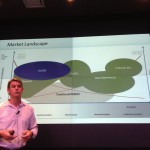

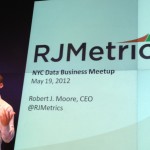
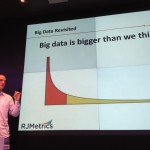
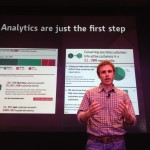
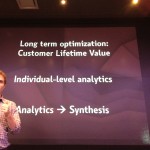
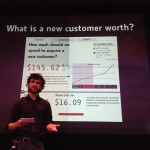


What has always interested me about the potential of Big Data Analytics and Analytics in general is how many insights can truly be data driven without someone manning the controls? (Or at least without someone pushing the controls in a particular direction)? The hype of Big Data I think leads people to believe it will deliver miracles like automatic golden nuggets of insight.
It was interesting to hear that Custora creates certain groupings that are used to analyze customer behavior. Since they have experience in their market it makes perfect sense to utilize established metrics or methodologies that have been proven to work.
But what about when a company new to analytics buys a package and wants to find “Insights”. Can they plug it in and press “Go”? Vendor marketing seems to say yes. My intuition says no.
I suspect meetup attendees from the business-side would agree with me. But maybe data gurus and statisticians would feel there MUST be a way to let the data sing. We can do better than the human brain!
A different meetup I attended last year included a presentation by Autonomy Corp. It was fascinating to hear how they group articles and information based on actual article content and not on Yahoo-style predetermined buckets. I looked like the beginning of real-life delivery of the insights from data people expect.
I would love to see a panel that discusses the importance of data vs. domain knowledge in delivering actionable insights. I hope we can have constructive conversations that change minds or at least help people with different points of view to understand each other.
@Craig: Great question. And, as a vendor, you won’t be surprised to hear that we believe it’s possible. It’s what we strive for!
One of the challenges in productizing the leap from “analytics” to “insights” is the creating a well-defined problem. While it might be extremely difficult to create a “Big Data Analytics Tool” that mines through *any* data set and automatically sifts out the golden nuggets of info for *any* data question, the challenge becomes more reasonable when focusing on specific questions.
For example, at Custora, retailers ask us “How much should I spend to acquire a new customer?” The inputs are well defined – purchase history and customer info containing X number of covariates. The output is well defined – predicted lifetime value for new customers. We can write software that uses the latest predictive techniques to take us from input to output. Granted, it’s not a trivial task. But within a well defined problem, we can think through – and therefore automate – the steps required to go from simple analytics to the insights/conclusions we’re looking for.
If it were trivial everyone would be doing it right?
I understand what you’re saying about not trying to build the all-singing, all-dancing analytics tool. I realize now that even in my example, a tool that looks at text and decides what is important and how therefore to cluster groups of articles would be very different to one that needs to predict streams of revenue and expense. Thanks for the reply.
@craig We had Boston Hadoop Meetup where the panelists debated (respective or combined) merits of more data, better data, and better algorithms. Only one–Paolo Guadiano from Icosystem, a complex systems consultancy (they do complexity models for casinos and govt)–argued that you could achieve accurate models with algorithms and domain expertise alone. The most popular choice was to have a decent amount of high-quality data, which supports your intuition that analytics solutions are not plug-and-play.
@Craig: Having seen a variety of our customers at InfiniDB using Big Data/Analytics, I would say that it’s up to each enterprise or entrepreneur to figure out how they’ll create value (and often, revenue) through analytics. Companies are competing through analytics in similar ways, just with more data, different types of data and with better tools.
Craig, it’s indeed an important question. I think anyone who actively follows the big data debate would understand that technology only takes you so far — after all, extracting insights from data is the key mission of data scientists, and that’s largely a human process. But this aspect may indeed be lost on some business buyers, and there’s a real risk for big data technology vendors to overhype what their technology can do — this may accelerate the “hype cycle” of big data technology, and push it quicker than it should towards the inevitable disillusionment phase. I believe the industry has a collective responsibility to not over promise and under deliver… but of course, self-restraint is hard to do when there’s VC money to be raised and new customers to close.
Both are great points.
Firstly, its good news for humans that we still will be needed to ask the right questions and review the results. My desire is for tools that push the need for human intervention until later in the process as much as possible. This, so that less technical business users will be able to review and then act more easily and efficiently without special training.
Secondly, hype certainly could get out of hand as vendors attempt to stand out from their competitors. But another source of hype may be the very media coverage that has introduced the benefits of Big Data analysis to general businesses users. While I have not heard mention of Big Data on the nightly news (yet?), I have seen it in many business magazines, newspapers and other outlets as well. This coverage brings attention to the idea and lends it some legitimacy as a more mainstream business tool. But when the stories run dry of how profitable it can be, the focus may turn to failures to deliver and feed the disillusionment you refer to.